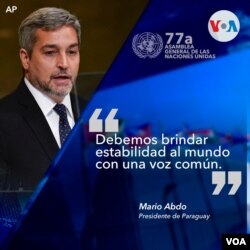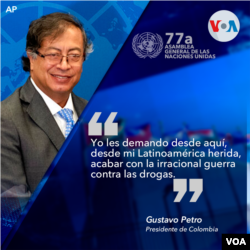Leaders from the region and the world alluded on Tuesday during the first high-level session of the 77th UN General Assembly to key issues, including the human rights situation in Nicaragua, the prolonged Venezuelan crisis, the fight against drugs and world peace.
1-Arrests and persecution in Nicaragua
Following tradition, the first to speak during the Assembly was the president of Brazil, Jair Bolsonaro, who denounced this Tuesday the administration of Daniel Ortega in Nicaragua, in the context of the complaints due to the persecution of priests and nuns Catholics and offered Brazil as a host country.
Bolsonaro’s statements follow Ortega’s actions against the Catholic Church and some of its representatives critical of his government, whom he has called “devils in cassock” and “coupists”.
Chilean President Gabriel Boric also alluded in his speech to the UN to the situation in the Central American nation and urged the nations to “continue working to contribute to the release of political prisoners in Nicaragua.”
The Ortega government maintains imprisoned since 2021 more than 120 political prisonersincluding several presidential candidates deprived of participating in the elections in which he was Ortega was re-elected.
2-Crisis in Venezuela
The Brazilian president highlighted Brazil on Tuesday as the recipient of thousands of refugees, starting with “450,000 Venezuelan citizens who have found assistance in Brazil… they have access to the labor market, public services and social benefits.”
Bolsonaro indicated that in recent months “around 600 Venezuelans have arrived in Brazil on foot every day.”
The Chilean president also referred on Tuesday to the situation in Venezuela.
“[La] humanitarian crisis, product of its prolonged political crisis, has generated a migratory flow that is unprecedented in our region and in our country, putting tremendous pressure on our institutions and our society,” he said, referring to Venezuela.
According to the Regional Interagency Coordination Platform (R4V), established at the request of the United Nations Secretary General to UNHCR and IOM, from April 12, 2018 to September of this year there are 5.2 million refugees and migrants from Venezuela displaced worldwide, and about 4.3 million are in Latin America and the Caribbean.
The Displacement of millions of Venezuelans represents the largest migration crisis in the hemisphere and the second in the whole world, after Syria.
For his part, the Paraguayan president, Mario Abdo Benítez, affirmed that his country will lead a petition in the UN Human Rights Council to approve an investigation into the violation of human rights.
“We have always supported the Venezuelan people, that is why we will be leading the Human Rights Council to approve a resolution that investigates the violation of human rights in Venezuela,” he told the Assembly.
Various human rights organizations have denounced that the Venezuelan authorities “have initiated a wave of selective arrests” against workers, social activists and opposition leaders.
The office of the UN High Commissioner for Human Rights also warned in June that the concern about restrictions on civic and democratic spaceon the conditions of detention in centers “previously administered by the intelligence services.”
3-Fight against drugs
Colombia’s first leftist president, Gustavo Petro, called on Latin American countries to join forces to end the war on drugs at the UN on Tuesday.
His statement included some of his old rhetoric against the global approach to drugs, which he has called a failure. Upon taking office from him in August, Petro called for the development of a new international strategy to combat drug trafficking.
“Behind the addiction to cocaine and drugs, behind the addiction to oil and coal, is the true addiction of this phase of human history: the addiction to irrational power, profit and money,” Petro said. on Tuesday.
The South American country, considered the world’s leading cocaine producer, is under pressure from the United States and other nations to reduce cocaine production.
In July, the White House Office of National Drug Control Policy (ONDCP) reported that Colombia’s potential cocaine production fell to 972 tons in 2021 from 994 tons the previous year.
Connect with the Voice of America! Subscribe to our channel Youtube and turn on notifications, or follow us on social media: Facebook, Twitter and Instagram.

















Add Comment